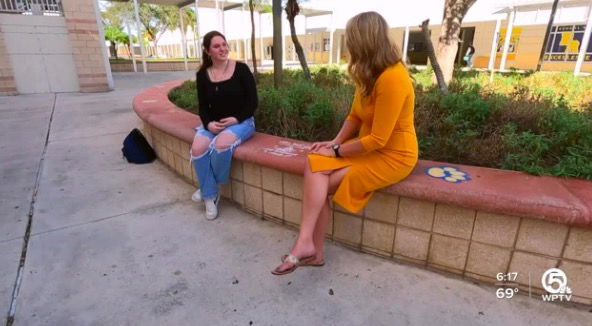Boca Raton teen shares mental health journey

Boca Raton High School senior Elyse Potash speaks to WPTV anchor Ashley Glass during the 2022-23 academic year.
By Ashley Glass
Click here for updates on this story
BOCA RATON, Florida (WPTV) — Boca Raton High School senior Elyse Potash said it feels like a miracle at times that she’s here and able to talk about her mental health journey.
“It’s really amazing. If you told me this would be me, I wouldn’t have believed you,” Potash said. “I myself have struggled with depression and anxiety.”
The Centers for Disease Control and Prevention now reports nearly three in give teen girls feel persistently sad or hopeless. That’s according to information gathered in the CDC’s 2021 Youth Risk Behavior Survey.
“I think after the pandemic, everyone was locked in for so long, and there was no interaction, and it kind of made everything that was there prior to COVID come out even more,” Potash said.
School District of Palm Beach County officials tell WPTV of its roughly 180,000 students, 17,000 have worked with mental health professionals on campus from partner agencies so far this year. The support is free on campuses. District officials said the biggest struggles are with depression and anxiety.
Potash has gotten involved with her school’s version of a national program called We Dine Together, which works to make sure no student feels isolated in the cafeteria.
“It’s just building a sense of community where it might not have otherwise been letting everyone know they’re not alone,” Potash said. “It makes a big difference.”
Potash is now a leader within We Dine Together. She also films and edits her school’s Motivational Monday videos that are posted online and shared in classrooms.
“The less you see it, the less you want to talk about it because you think it’s something you deal with or you’re an outcast. But honestly, if you talk to almost anyone, you’ll see everyone has some sort of struggle in their life,” Potash said.
School district officials tell WPTV there is more than six hours of youth mental health first aide training that’s mandatory each year for all school staff members, with a recertification requirement every three years. The training entails teaching school staff how to be “noticers” and spot a child in crisis in order to get them the proper support.
Dr. Eleanor Craft, a district-wide instructor for youth mental health first aide training, said people are trained to look for changes, big or small, in a child’s appearance or behavior or if they suddenly lose interest in something.
“If they’re not replacing it with something else, that’s the biggest thing,” Craft said. “Maybe dance has been our passion, and we don’t replace it with something, that’s when a student could be shifting into potential crisis.”
District officials said that moving forward, there are plans to implement more trauma-informed training for school staff.
Please note: This content carries a strict local market embargo. If you share the same market as the contributor of this article, you may not use it on any platform.
